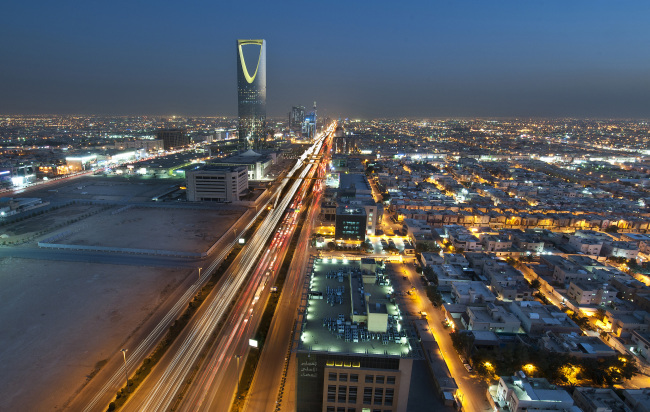 |
The Kingdom Tower stands illuminated at night on King Fahad Road in Riyadh, Saudi Arabia. (Bloomberg) |
Saudi Arabia is seeking to open its $509 billion stock exchange to foreign investors in April, according to three people briefed on the country’s plans.
The Capital Market Authority informed brokers and fund managers of the timeline in London last month, two of the people said, asking not to be identified as the meeting was private. Saudi Arabia isn’t planning significant changes to draft rules published in August, the people said. The country announced in July that it would open the market in the first half of 2015.
The world’s biggest oil exporter is removing barriers to one of the world’s most-restricted major stock exchanges as it pursues a $130 billion spending plan to boost non-energy industries. Opening the market may prompt MSCI Inc. to include the bourse in its emerging market gauge by 2017, luring as much as $40 billion of foreign cash, Schroders Plc. said in July.
A spokesman for the CMA said that the regulator continues to expect the market to open to foreign investors in the first half of next year, though no specific date is set.
The Saudi Stock Exchange is the largest equity market in the Middle East. Investors from outside the six-nation Gulf Cooperation Council aren’t allowed to buy shares directly and have to access the market through equity swaps and exchange-traded funds.
Under the August draft regulations, foreign investors with a minimum of 18.75 billion riyals ($5 billion) of assets under management and at least five years experience in the business will be eligible to trade Saudi stocks. The regulator said it may reduce the minimum for those assets to 11.25 billion riyals.
The Riyadh-based regulator may also cap foreign ownership of a single stock at 49 percent, according to the draft rules. Qualified foreign investors, or QFIs, would face a 5 percent ownership limit in a single stock, and a 20 percent ceiling for all QFIs and approved QFI clients combined, it said. The QFIs’ holdings may not exceed 10 percent of the market’s value, including interests under swaps, according to the draft rules. (Bloomberg)







![[Today’s K-pop] Blackpink’s Jennie, Lisa invited to Coachella as solo acts](http://res.heraldm.com/phpwas/restmb_idxmake.php?idx=644&simg=/content/image/2024/11/21/20241121050099_0.jpg)
